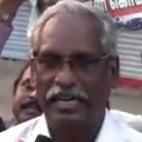With its influence on UN Security Council and as an elected member of the 47-member UN Human Rights Council, the current Indian establishment will secretly put its weight behind Colombo’s efforts to block international investigations, K. Aiyanathan, a senior journalist in Tamil Nadu told TamilNet Saturday. Urging the political forces in Tamil Nadu to checkmate New Delhi by calling for war crimes investigations against key Indian personalities if they continue to abet the Rajapaksa regime, the journalist told TamilNet that Diaspora Tamils should convince France, a permanent member in the Security Council and a member state of the Human Rights Council to stay the course of justice as the Council is scheduled to hold its 17th session from 30 May to 17 June at the Palais des Nations in Geneva.
 The call from Tamil Nadu journalist comes while some Tamil diaspora personalties were airing false hopes on Indian ‘change’.
The call from Tamil Nadu journalist comes while some Tamil diaspora personalties were airing false hopes on Indian ‘change’.
Diaspora Tamil organisations should conduct awareness campaign in France and in front of the Russian embassies worldwide, Mr. Aiyanathan said.
Setting the trend on International investigations against Tamil genocide is the way forward for the freedom of Eezham Tamils, he told TamilNet.
On India, he said New Delhi had intentionally avoided any remark to the increasing demand for international investigations in its recent joint statement with Sri Lanka.
Recently, Sri Lankan External Affairs Minister G.L.Peiris came to India, in an attempt to sabotage the global trend that demands international investigations. Peiries stayed here for 3 days meeting Indian Prime Minister Manmohan Singh, Foreign Minister SM Krishna, Indian National Security Advisor Shivshankar Menon and Nirupama Menon Rao the foreign secretary of India.
“The current National Security Advisor, Shivshankar Menon, was one of the three key figures, who were instrumental in India abetting the Sri Lankan state in the genocidal war against the Eezham Tamils,” Mr. Aiyanathan told TamilNet.
SL President Mahinda Rajapaksa himself has gone on record saying that he was fighting India’s War, Mr. Aiyanathan said, warning Tamils against India’s influence on UN Security Council.
At the 11th session the UN Human Rights Council in May 2009, a move by countries like Mexico, Argentina, Chile, the Czech Republic, Mauritius and Switzerland in bringing a strong resolution against the Sri Lankan state was defeated by India, Pakistan, Brazil and Cuba that brought a resolution supporting the genocidal Sri Lankan state.
29 countries voted supporting Sri Lanka. Of these, 15 countries hold seats as the Council is meeting on its 17th session on Monday.
The Human Rights Council, an intergovernmental body empowered to prevent abuses, inequity and discrimination, protect the most vulnerable, and expose perpetrators, which meets in Geneva 10 weeks a year, is composed of 47 elected United Nations Member States who serve for an initial period of 3 years.
Recently, membership for 15 seats came up for election.
“[F]ewer than half of the 47 member council can be characterized as democracies,” said John J. Metzler, a reputed UN correspondent, while reporting the recent election of new Member States into the Council.
“[G]iven the composition of some of the Geneva-based Council membership, with countries like China, Cuba, Russia and Saudi Arabia sitting in judgment of global human rights issues is like having Tony Soprano sit on a Senate sub-committee on organized crime,” the US based writer further wrote.
The three-year elected UN Human Rights Council’s 47 seats are distributed in regional voting groups, 13 seats in Africa, 13 in Asia, 8 in Latin America, 7 in Western European and Others Group (WEOG), and 6 in Eastern Europe.
In the list of the 15 of 47 Member States elected in May 2011 are 6 new countries that have never served in the UNHRC earlier: Austria (2014), Benin (2014), Botswana (2014), the Republic of Congo (2014), Costa Rica (2014) and Kuwait (2014) are the new countries.
The other 9 elected Member States are: Burkina Faso (2014), Chile (2014), Czech Republic (2014), India (2014), Indonesia (2014), Italy (2014), Peru (2014), Philippines (2014) and Romania (2014).
The other Member States are: Angola (2013); Bangladesh (2012); Belgium (2012); Cameroon (2012); China (2012); Cuba (2012); Djibouti (2012); Ecuador (2013); Guatemala (2013); Hungary (2012); Jordan (2012); Kyrgyzstan (2012); Libyan Arab Jamahiriya (2013)*; Malaysia (2013); Maldives (2013); Mauritania (2013); Mauritius (2012); Mexico (2012); Nigeria (2012); Norway (2012); Poland (2013); Qatar (2013); Republic of Moldova (2013); Russian Federation (2012); Saudi Arabia (2012); Senegal (2012); Spain (2013); Switzerland (2013); Thailand (2013); Uganda (2013); United States (2012); and Uruguay (2012).
[* Libya has lost its seat in the HRC].
On May 26 and 27, 2009, seventeen Member States, Argentina, Bosnia-Herzegovina, Canada, Chile, France, Germany, Italy, Mauritius, Mexico, the Netherlands, Slovenia, Slovakia, South Korea, Switzerland, Ukraine, Uruguay, and the United Kingdom, promoted a strong resolution against Sri Lanka.
Of these 17 countries, only four hold seats in the Council this time.
Although the move failed in 2009, the efforts of Mexico, Argentina, Chile, the Czech Republic, Mauritius and Switzerland were applauded by human rights watchdogs.
The 29 countries that supported Sri Lanka at that time were: Angola, Azerbaijan, Bahrain, Bangladesh, Bolivia, Brazil, Burkina Faso, Cameroon, China, Cuba, Djibouti, Egypt, Ghana, India, Indonesia, Jordan, Madagascar, Malaysia, Nicaragua, Nigeria, Pakistan, Philippines, Qatar, Russian Federation, Saudi Arabia, Senegal, South Africa, Uruguay and Zambia.
The 12 countries that voted against the pro-Sri Lanka resolution in 2009 were: Bosnia and Herzegovina, Canada, Chile, France, Germany, Italy, Mexico, Netherlands, Slovakia, Slovenia, Switzerland, United Kingdom of Great Britain and Northern Ireland.
Argentina, Gabon, Japan, Mauritius, Republic of Korea and Ukraine had abstained in 2009.
(For updates you can share with your friends, follow TNN on Facebook and Twitter )
